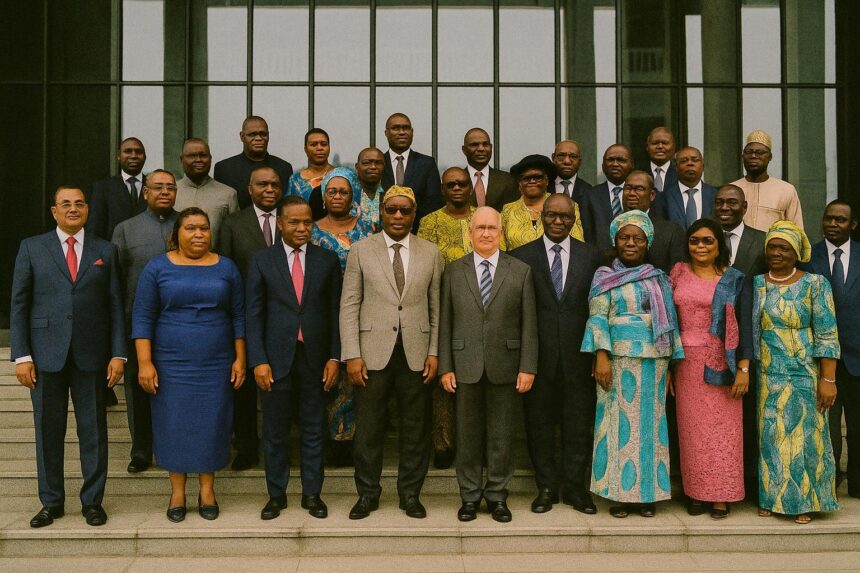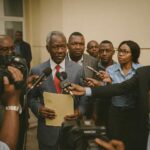A strategic moment for parliamentary capacity-building
In a political calendar already punctuated by budget preparations and sub-regional diplomacy, the decision of the Congolese Labour Party (PCT) caucus and its allies to convene an intensive seminar on decentralisation carries particular institutional weight. The upper chamber, historically perceived as the guardian of territorial balance, gathered its entire presidential majority for forty-eight hours behind closed doors in Brazzaville. According to the organising chair, Senator Théophile Adoua, the objective is to enable lawmakers to exercise more granular scrutiny over government policy and to anticipate the legislative fine-tuning required before the next tranche of competences is transferred to local authorities.
French lessons in territorial governance
The inaugural lecture, delivered by Sorbonne constitutionalist Jean Giraldon, placed Congo’s reform in a broader francophone trajectory. By retracing four decades of French territorial reforms—from the 1982 Defferre laws to the 2015 NOTRe statute—the professor highlighted incrementalism, political consensus-building and robust administrative courts as three silent pillars of effective devolution. Senators listened attentively as Giraldon warned that decentralisation without legally predictable revenue streams risks creating ‘hollow municipalities’ unable to meet citizen expectations, a scenario that can fuel populist disillusionment. His comparative perspective resonated with several committee chairs who privately conceded that the French case illustrates both the promise and the inescapable patience required by territorial reforms (Les Dépêches de Brazzaville, 17 July 2023).
Clarifying competences and resources
The workshop’s second analytical block, entrusted to Charles Ngafouomo, High Commissioner for Electoral Reforms, dissected the legal labyrinth surrounding the transfer of competences in Congo. Ngafouomo recalled that the 2003 constitutional revision and the 2011 framework laws already delineate sixteen areas earmarked for sub-national management, ranging from primary education infrastructure to rural feeder roads. Yet only six have been effectively devolved. The mismatch, he argued, stems less from political reticence than from the complexity of aligning sectoral decrees, civil-service statutes and revenue-sharing formulas. He advocated a phased timetable anchored in medium-term expenditure frameworks and recommended that each competence be accompanied by a quantified cost envelope endorsed by both chambers. In the corridor discussions, several senators viewed this suggestion as a pragmatic antidote to the perennial dispute between local councils and central ministries over unfunded mandates (Radio Congo, 18 July 2023).
Budgetary oversight as a lever of accountability
For many participants, the most immediate lever of influence remains budgetary oversight. Economist Théodore Boutsoki Kombo, drawing on a decade of monitoring finance bills, reminded senators that Article 76 of the Organic Law on Public Finance gives the Senate equal footing with the National Assembly in approving revenue projections and sectoral ceilings. He encouraged the chamber to deploy its newly created Parliamentary Budget Office to produce territorial impact notes so that each amendment explicitly maps fiscal allocations to departmental development plans. Such an approach, he maintained, would cement the Senate’s relevance while compelling line ministries to respect the spirit of devolution. Senators from Likouala and Niari departments expressed hope that greater transparency in transfers could also mitigate the perception of geographic inequity that occasionally surfaces in national debate.
Balancing national unity with local aspiration
Beyond technicalities, the seminar unfolded against a backdrop of persistent regional expectations. Since President Denis Sassou Nguesso relaunched the decentralisation portfolio in 2018, local stakeholders have sought clearer articulation of how devolution will intersect with the national development plan and the African Continental Free Trade Area. Senior senator Sophie Tchicaya underscored that decentralisation cannot be a mere administrative exercise; it must remain ‘a vector of cohesion that consolidates rather than fragments the Republic’. Her observation echoed recent statements by the Prime Minister that institutional reforms should fortify Congo’s capacity to negotiate cross-border infrastructure and climate-adaptation funding, spheres that require coherent national stewardship even as municipalities gain latitude in day-to-day service delivery.
Political symbolism and pragmatic expectations
Observers versed in Central African legislative politics note that organising a high-profile capacity-building session in mid-term sends a calibrated signal. It reassures local elected officials that the Senate remains attentive to ground-level concerns while affirming the majority’s commitment to measured reform rather than abrupt institutional upheaval. Diplomatic missions represented in Brazzaville interpret the exercise as a demonstration of legislative maturity that could bolster donor confidence in forthcoming municipal-investment windows administered by the World Bank and the African Development Bank. Although the workshop concluded without a formal communiqué, participants concurred on the need for a follow-up audit of the fiscal decentralisation chain before the 2024 finance act is tabled. In the words of Senator Adoua, ‘By deepening our mastery of comparative experiences and budgetary instruments, we prepare ourselves to guide decentralisation in a manner that strengthens the state while empowering our communities.’




















